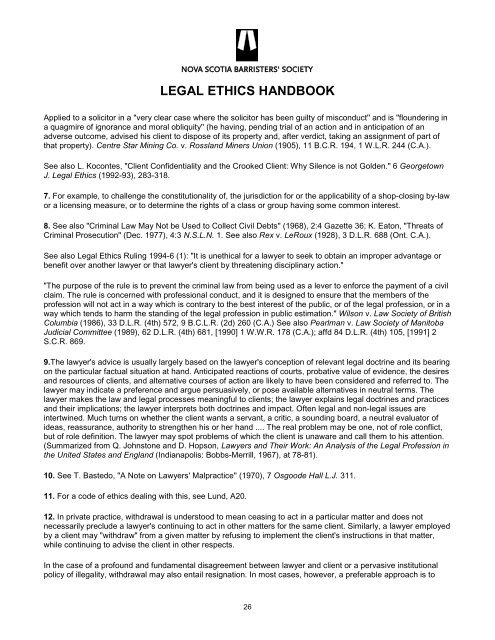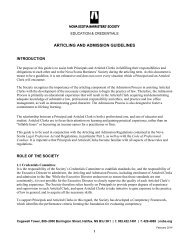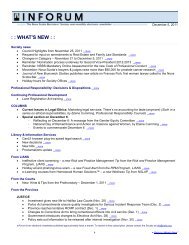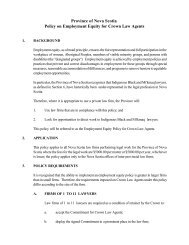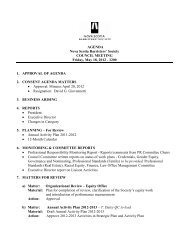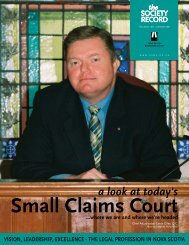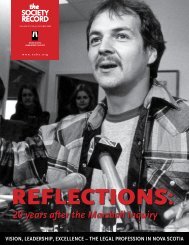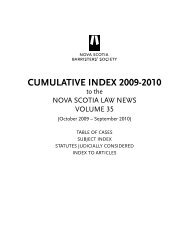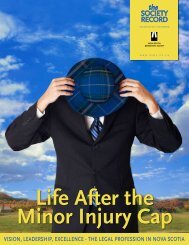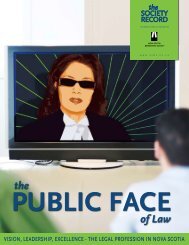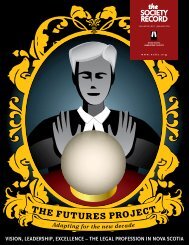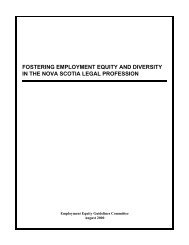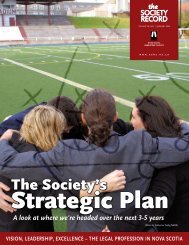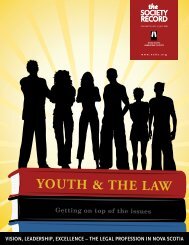legal ethics handbook - Nova Scotia Barristers' Society
legal ethics handbook - Nova Scotia Barristers' Society
legal ethics handbook - Nova Scotia Barristers' Society
You also want an ePaper? Increase the reach of your titles
YUMPU automatically turns print PDFs into web optimized ePapers that Google loves.
LEGAL ETHICS HANDBOOK<br />
Applied to a solicitor in a "very clear case where the solicitor has been guilty of misconduct'' and is "floundering in<br />
a quagmire of ignorance and moral obliquity'' (he having, pending trial of an action and in anticipation of an<br />
adverse outcome, advised his client to dispose of its property and, after verdict, taking an assignment of part of<br />
that property). Centre Star Mining Co. v. Rossland Miners Union (1905), 11 B.C.R. 194, 1 W.L.R. 244 (C.A.).<br />
See also L. Kocontes, "Client Confidentiality and the Crooked Client: Why Silence is not Golden." 6 Georgetown<br />
J. Legal Ethics (1992-93), 283-318.<br />
7. For example, to challenge the constitutionality of, the jurisdiction for or the applicability of a shop-closing by-law<br />
or a licensing measure, or to determine the rights of a class or group having some common interest.<br />
8. See also "Criminal Law May Not be Used to Collect Civil Debts'' (1968), 2:4 Gazette 36; K. Eaton, "Threats of<br />
Criminal Prosecution" (Dec. 1977), 4:3 N.S.L.N. 1. See also Rex v. LeRoux (1928), 3 D.L.R. 688 (Ont. C.A.).<br />
See also Legal Ethics Ruling 1994-6 (1): "It is unethical for a lawyer to seek to obtain an improper advantage or<br />
benefit over another lawyer or that lawyer's client by threatening disciplinary action."<br />
"The purpose of the rule is to prevent the criminal law from being used as a lever to enforce the payment of a civil<br />
claim. The rule is concerned with professional conduct, and it is designed to ensure that the members of the<br />
profession will not act in a way which is contrary to the best interest of the public, or of the <strong>legal</strong> profession, or in a<br />
way which tends to harm the standing of the <strong>legal</strong> profession in public estimation." Wilson v. Law <strong>Society</strong> of British<br />
Columbia (1986), 33 D.L.R. (4th) 572, 9 B.C.L.R. (2d) 260 (C.A.) See also Pearlman v. Law <strong>Society</strong> of Manitoba<br />
Judicial Committee (1989), 62 D.L.R. (4th) 681, [1990] 1 W.W.R. 178 (C.A.); affd 84 D.L.R. (4th) 105, [1991] 2<br />
S.C.R. 869.<br />
9.The lawyer's advice is usually largely based on the lawyer's conception of relevant <strong>legal</strong> doctrine and its bearing<br />
on the particular factual situation at hand. Anticipated reactions of courts, probative value of evidence, the desires<br />
and resources of clients, and alternative courses of action are likely to have been considered and referred to. The<br />
lawyer may indicate a preference and argue persuasively, or pose available alternatives in neutral terms. The<br />
lawyer makes the law and <strong>legal</strong> processes meaningful to clients; the lawyer explains <strong>legal</strong> doctrines and practices<br />
and their implications; the lawyer interprets both doctrines and impact. Often <strong>legal</strong> and non-<strong>legal</strong> issues are<br />
intertwined. Much turns on whether the client wants a servant, a critic, a sounding board, a neutral evaluator of<br />
ideas, reassurance, authority to strengthen his or her hand .... The real problem may be one, not of role conflict,<br />
but of role definition. The lawyer may spot problems of which the client is unaware and call them to his attention.<br />
(Summarized from Q. Johnstone and D. Hopson, Lawyers and Their Work: An Analysis of the Legal Profession in<br />
the United States and England (Indianapolis: Bobbs-Merrill, 1967), at 78-81).<br />
10. See T. Bastedo, "A Note on Lawyers' Malpractice'' (1970), 7 Osgoode Hall L.J. 311.<br />
11. For a code of <strong>ethics</strong> dealing with this, see Lund, A20.<br />
12. In private practice, withdrawal is understood to mean ceasing to act in a particular matter and does not<br />
necessarily preclude a lawyer's continuing to act in other matters for the same client. Similarly, a lawyer employed<br />
by a client may "withdraw" from a given matter by refusing to implement the client's instructions in that matter,<br />
while continuing to advise the client in other respects.<br />
In the case of a profound and fundamental disagreement between lawyer and client or a pervasive institutional<br />
policy of il<strong>legal</strong>ity, withdrawal may also entail resignation. In most cases, however, a preferable approach is to<br />
26


